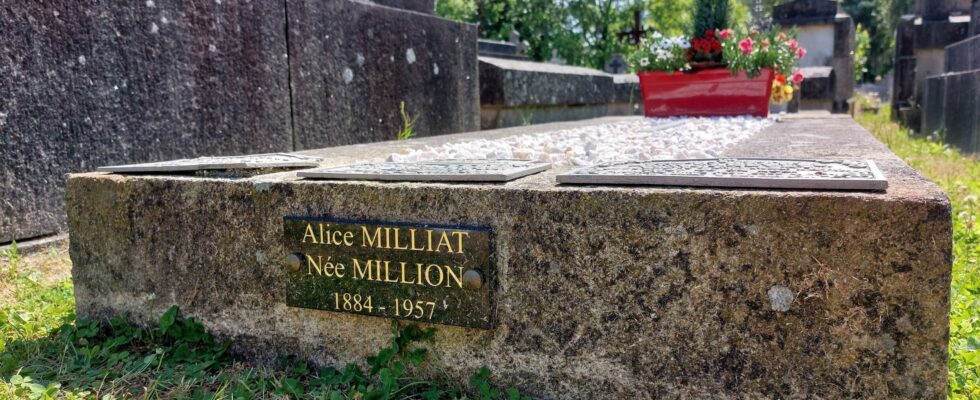Almost no one knew her name until a few years ago, yet her work is immense: Alice Millat fought all her life to allow women to participate in sporting competitions, to the point of creating an all-female Olympic Games in beginning of the 20th century. Avant-garde fights that echo those that still need to be fought for better visibility of women in sport.
Originally, there was not even a first or last name on Alice Milliat’s grave, which lies in a cemetery in Nantes, in western France. “ It is an extremely simple tomb. His burial is as modest as his work is great », Stéphane Gachet likes to say. This enthusiast of Olympic Games dedicated a biography to him in 2019, Alice Milliat – The twenty years who founded women’s sport (The book company) and contributed, at the same time, to bringing it out of oblivion.
At the beginning of the 20th century, Alice Milliat, a rowing enthusiast, campaigned for women to join sports competitions, against the discourse imposed by religion and even certain doctors. “ The woman was not to undress or expose herself in public. She absolutely had to protect herself. Her only goal was to give birth », summarizes Stéphane Gachet.
Going against the conventional wisdom, Alice Milliat believes that to change things, women’s clubs must be led by women. So, in 1915, she took charge of a gymnastics club in Paris, which she opened to other sports such as athletics, basketball, football, rugby and hockey. For its time, it was more than innovative. But the context is favorable, points out Stéphane Gachet: “ An important event occurs : WWI. Men will free up their places in homes, in factories and on sports fields. »
In 1919, a new stage, she helped found the federation of women’s sports societies which she directed. Then, she asked the Olympic committee to include women’s athletics events in the Olympic Games. Categorical refusal from its then president: Baron Pierre de Coubertin. “ I personally do not approve of women’s participation in public competitions. At the Olympic Games, their role should above all be to crown the winners », he explains in a sound archive.

Never mind, Alice Milliat responded to this refusal in 1922 by creating the first women’s Games in Paris. The success was immediate and lasted until the last edition in 1934. It is reported that there are more than 20 000 spectators in the stadiums and sporting performances that have nothing to envy of men », develops Stéphane Gachet.
The final blow came in the 1940s, under the Vichy regime which completely erased this heritage by prohibiting women from practicing sports in public competitions. It’s as if the sport of the 20s and 30s never existed », Points out Stéphane Gachet again. So much so that Alice Milliat died to general indifference in 1957.
The fight continues today
But in recent years, his name and his work have resurfaced. A few steps from the cemetery, where she is buried, a nursery and elementary school is under construction. “ It will be the first school in France to bear the name of Alice Milliat », Rejoices Stéphane Gachet, who also serves as regional advisor to the Pays-de-la-Loire region.
HAS Paris also, initiatives are put in place. Including a guided tour led by the “Feminists in the City” association and the Alice Milliat Foundation. Around twenty people present that day in the footsteps of some figures of women’s sport, ” that we try to link to contemporary issues linked to feminism », explains Sonia, the guide-lecturer, by way of introduction.
The visit begins in front of the entrance to the French National Olympic and Sports Committee (CNOSF), located in 14e district of Paris. “ There are two statues which sit here in the hall of the CNOSFpoints to Sonia. On the right, we have Baron Pierre de Coubertin. And on the left, look who there: It’s Alice Milliat. And it was a long battle. It took seven long years for her to sit here. »

Caroline is one of today’s participants. “ This visit helps bring it out of oblivion, which is essential “. But Alice Milliat’s struggles are far from over, she judges. “ We need more women in the federations, we also need more money, because today it is not at all equivalent compared to men. In short, we are still far from having equity in sports practice between men and women. So the fight continues, as one would say ! »
For the first time at the Paris Olympic Games, there will be exactly the same number of women as men entered: 5,250 precisely. Parity is therefore achieved more than a century after the first women’s Olympic Games. Good news, of course, greets Tess Harmand. But the general director of the Alice Milliat foundation, created in 2016, is vigilant: “ We hope that this interest in Alice Milliat will not decline after the Games. We are hopeful that all the actions we are doing can continue well beyond the Olympiad. Because sport remains a fantastic tool for changing mentalities for more equality in society too. »
Read also“Olympism, a history of the world”: in Paris, an exhibition between sport and politics
